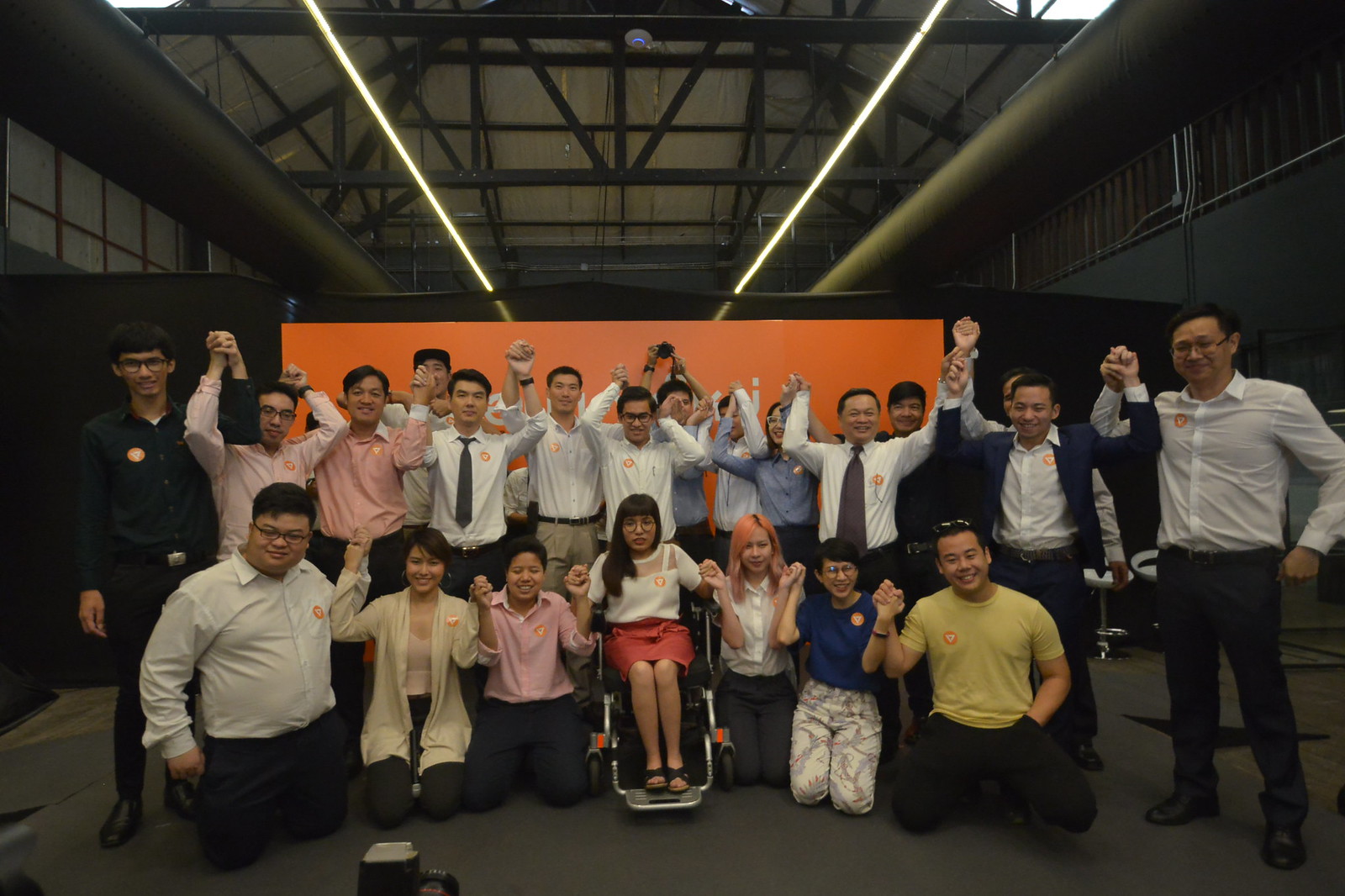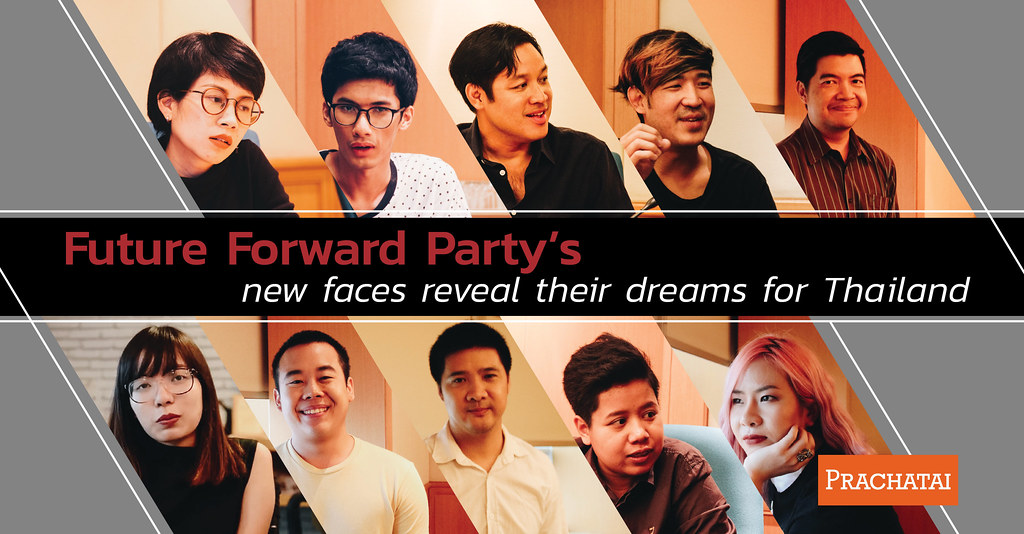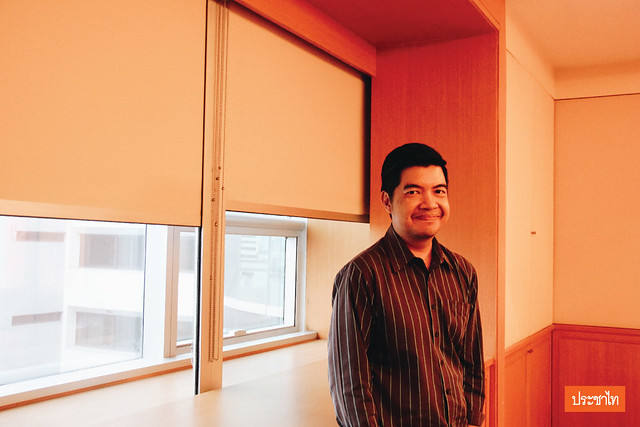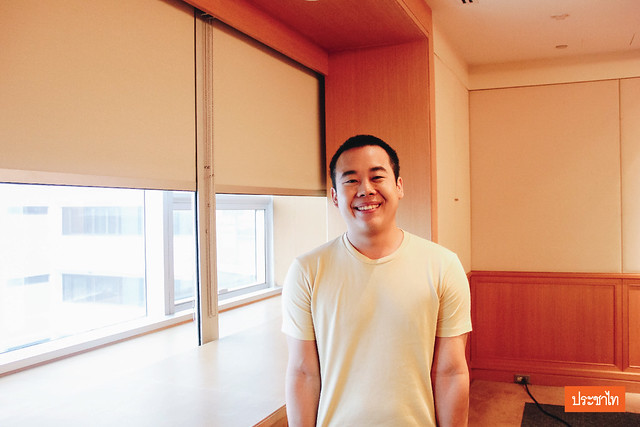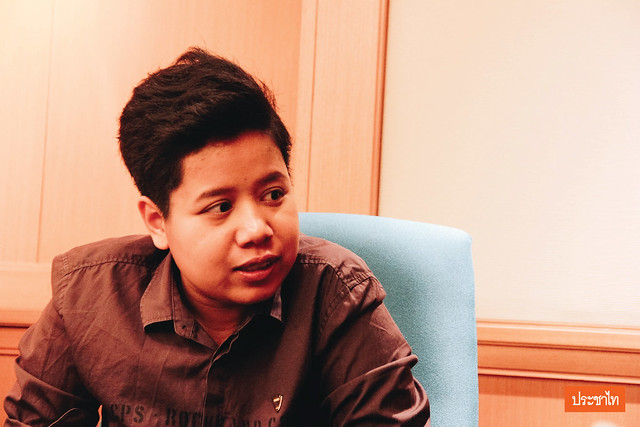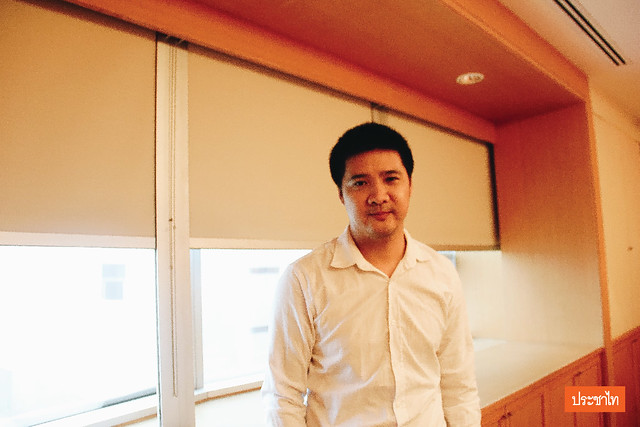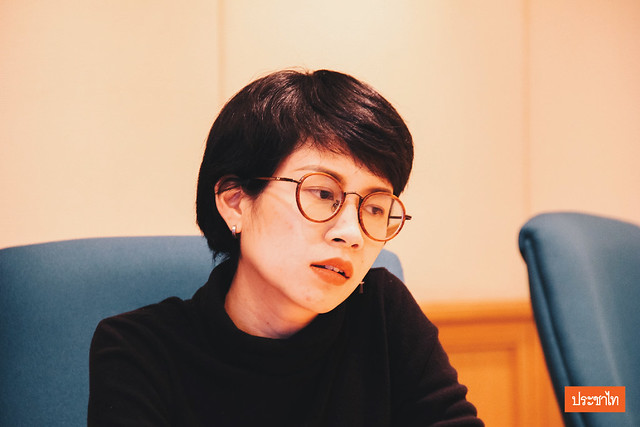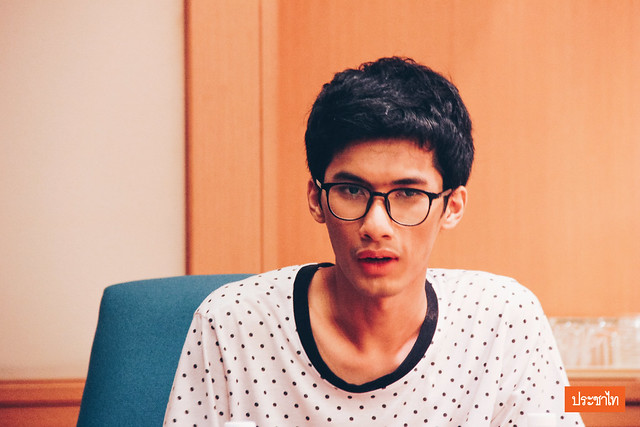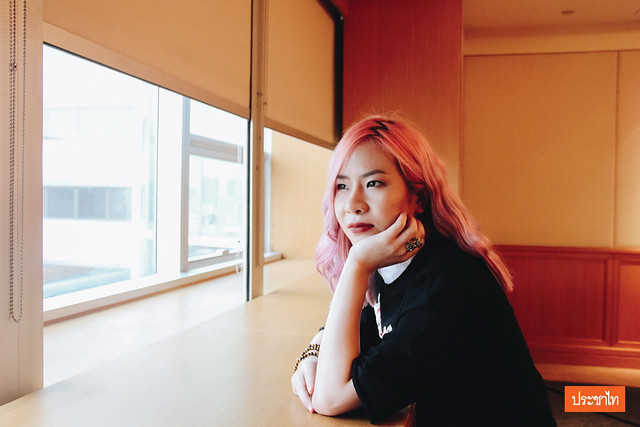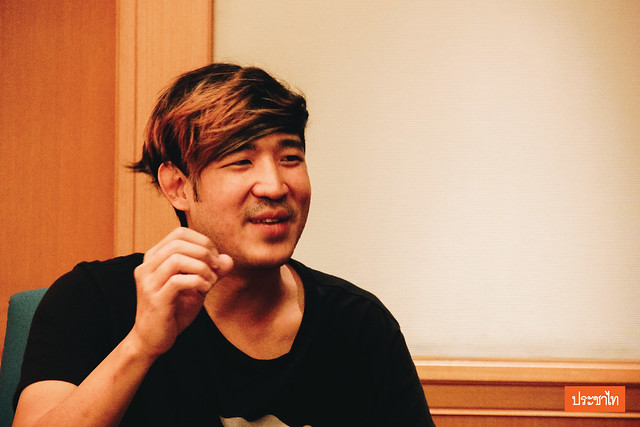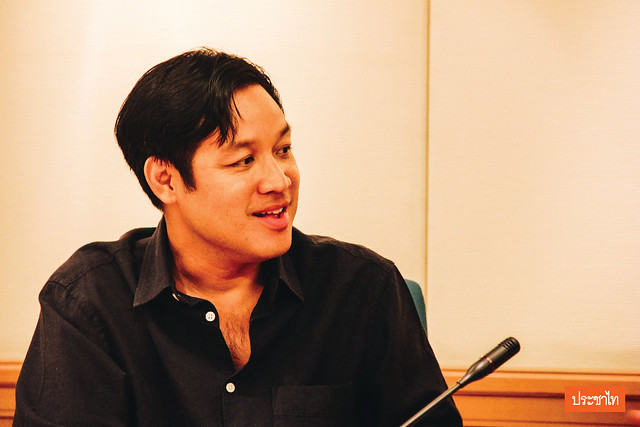This past 15 March, Thanathorn Juangroongruangkit and Piyabutr Saengkanokkul led 26 people from the new generation to register the
Future Forward Party at the Election Commission of Thailand (ECT).
The founding members of the Future Forward Party at a press conference on 15 March 2018
Looking like Justin Trudeau’s cabinet members who are from a diverse background, the founding members of the FFP included Nalutporn Krairisksh, a disabled journalist and founder of the Thisable.me news website about disabled people, Kath Khangpiboon, a trans lecturer and LGBT rights activist, Alisa Bindusa, a Muslim trans and environmental activist and Kritthanan Ditthabanjong, a 20-year-old HIV activist.
The party’s logo is an inverted pyramid. Wipaphan Wongsawang, a founding member who started Thaiconsent.org, explained that the logo means that “the poor and marginalised people, who are the majority of this country and used to be at the bottom, are replacing the elite, who are the minority, at the top”.
Prachatai interviewed 10 of the co-founding members who are all from different fields of work on the dreams they have for Thailand as well as the role of the new generation in making that dream come true.
Nalutporn Krairiksh: A society where everyone can live independently
Nalutporn, aged 25, was diagnosed with Amyotrophic Lateral Sclerosis (ALS) as a child and has to use a wheelchair. She is the founder of the Thisable.me website about disabled people. Nalutporn stated that she wants to see a future where people in Thailand can live independently and be self-reliant. She gave an example of disabled people in other countries as seen from documentaries: when they reach 18 years of age, they can live like any other able person of legal age, which means they can go out of their house by themselves. However, in Thailand, that kind of disabled people is hard to find, even if they are already 40 or 50 years old. “In Thailand, if a disabled person needs full-time care, they are usually looked after by parents or family members. This is not seen as a profession so they don’t get paid, but it is seen to be the same thing as looking after children or grandchildren. This is the patronage system, and there is domination over the disabled, resulting in the disabled not having the courage to live their own lives.”
Nalutporn said that the problem preventing disabled Thai people from being independent is due to the attitudes of Thai people who still don’t understand diversity and refuse to accept differences. When a new building, road, footpath or even the educational system or textbook is designed, they consider only those who have healthy bodies and consider policies for the disabled separately. Nalutporn disagrees with this method; she thinks that Thai society should focus on thinking of and implementing inclusive policies that will include all types of people in society in the same social structure system.
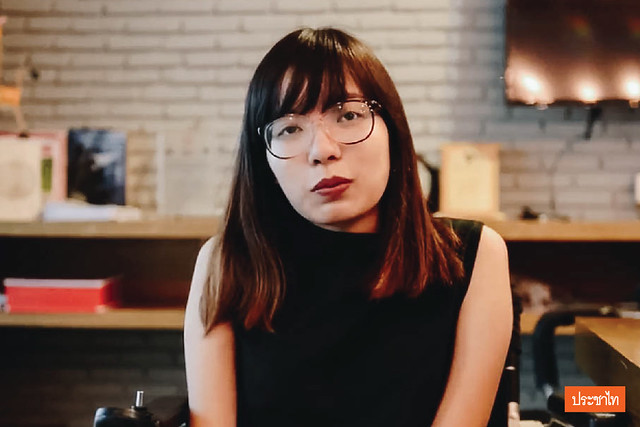
Nalutporn also stated that she is interested in politics and will show society that disabled people don’t need to deal only with matters concerning them. “To be in politics, for me, is something that appears to be challenging and very cool. I try imagining how I’d go out to campaign, when I can’t even walk out of the house. If I went out to campaign it’d probably trouble the people around me a lot, but it would show people that Thailand needs universal design. It would make the news, create a trend and people will see that a solution is needed and become a form of publicity for people facing problems like us.”
Klaikong Vaidhyakarn: An Open Government where everyone participates
Klaikong, aged 40, works at the Social Technology Institute. He was among those who pushed for Open Data in Thailand. He said that the problem he wants to solve is how to make people become more involved in the process of making state policies, whether at the local or national level. He wants a mechanism that uses direct democracy for budget and resource management. He stated “Actually, today, if we look at the number of citizens that access the internet in Thailand, it has already reached more than 70%. If we can give these people access to state information, allow them to voice their opinions and thoughts and reflect on their connection to the government, the policies will really come from the people. I want to see what foreign countries call ‘open government’.”
Klaikong wants government information, whether at the local level or from central government, to be disclosed as Open Data that allows normal people, state agencies and the business sector to use the information for their benefit, such as monthly budgets or expenses, as well as maps of clinics, student information and land rights on who owns how much land and where for sustainable future planning.
The reason Klaikong thinks that the new generation should have a role in politics is “because the old generation wasn’t able to succeed. The new generation has new ways of thinking that have changed. They have communication that’s not done top to bottom, not attached to rules and regulations. They have dreams. The new generation thinks that tomorrow must be better. I think many countries across the world have proven that the new generation can govern, they can be leaders. We may see examples in Trudeau of Canada, Macron of France, or Joshua Wong in Hong Kong. They can enter politics despite threats. But they can lead to the future of their countries that they want.”
Prempapat Plittapolkranpim: The development of the new generation, for the new generation, by the new generation
At the age of 23, Prempapat is a board member and director of NEW GROUND. The Thailand he wants to see doesn’t have anything complicated; it’s just waking up to find hope that life will be better than yesterday.
“When we dream of something, the easiest thing, easier than entering a voting booth, is to pray for a better life, at least in the next life, a life where we are born rich, are born in a country that supports its people better than this. But I dream of being in this country and seeing a better life in this life. Therefore, we should do something more than pray. If people wake up, there is hope that life must be better than yesterday, instead of wanting a better one in the next life. I think a society like this is not liveable, has no hope, no way out and no future to see. There may be a world with welfare that assures me that if I become unemployed, ill, or otherwise lose, I’ll still be a person of this world and not made into a commodity or turned into labour whose feelings no one cares about.”
When we delve into the work Prempapat does regarding the new generation, he said that developing the new generation today is the work of the new generation, for the new generation, but by adults. He went into details concerning the annual educational support budget per person where, even though it is very high, children and youth have almost zero contribution in deciding how to use this resource.
“We have a budget for small children then it jumps to a budget for workers and the elderly. But the new generation, about 15%, has access to welfare, excluding educational welfare, at 0.012%, which is 250 times less than developed countries. It is a clear violation of basic rights. They do not receive welfare at all. If they were born in another country, they would have this part of the budget to fulfil their lives. For example in Singapore, they have a budget for people to increase their skills. They can use the money for anything, and the state won’t decide for you. You can choose yourself. So there should be a budget for youth to solve their problems.”
In politics, Prempapat stated that Thai society has a democratic governing system, but has never had a democratic culture. If the new generation feels that politics is something close to home, they may create this culture.
Alisa Bindusa: Everyone is equal
Alisa, aged 23, apart from being a student at the Faculty of Law, Prince of Songkla University, Hat Yai Campus, also works with Law Long Beach, human rights movements and the Buku FC team. She dreams for a simple Thailand, but that’s not simple to realise in the current situation.
“The country I want to live in, firstly it’s a country that doesn’t get rid of anyone and is open to individual diversity. In each person, there is diversity, whether in religion, gender, or political views. But in the past, we didn’t protect these things and didn’t learn to live with these diversities. In the past, we’ve been in conflicts that lead to violence and exclusion, not towards learning at all. That’s why I want openness to diversity and learning to live with each other.”
“Secondly, we are all equal. We see everyone as really equal. Everyone has an equal voice, under an equally effective system of law. It is a very important matter. We have problems right now because we’re not equal. From the work I do, I have opportunities; I have space to express my opinions on various stages belonging to the state. But when I went there, I saw that there were a very small number of young people even though that project affected all of our lives, including the young. There was no obstruction, but it wasn’t really open for participation. There was no promotion, support for us to enter, and they were indifferent to us not going there. I want to see all voices in society viewed as equal, with a place for everyone to express their opinions, participate in making decisions – that is, everyone can be a politician and everyone can be involved in politics since it affects our lives.”
“Lastly is that the tax money of us all is efficiently used for matters we really need, whether it’d be health or education.”
Sastarum Thammaboosadee: A state that looks after everyone
A 33-year-old young male teacher from the College of Interdisciplinary Studies, Thammasat University, who has a dream and a firm belief that the state’s first goal is to support and care for everyone, that is, to have complete universal welfare, which according to research is possible.
“The new generation that has to shoulder the risk for many generations, shouldering hopelessness from the past generation and made us think of only our own issues; it’s come to the point where we have to think of what to do and how will we change the conditions for this to happen in our generation. It’s not only me who gives importance to a welfare state. I think half the people in the world are fighting for this, no matter what they call it - an equal society, human dignity, the fight for a better life - but the key point that brings everything together is the concept of a welfare state. It will change us from humans that are turned into machines by the capitalist system back into humans, with more dignity and with more freedom to choose.”
Sastarum said that creating the foundation for the concept of a welfare state is an urgent matter. The people must understand that it is a right, not just charity. He gave the example that no one knows how the minimum qualifications for work and pay came to use a bachelor degree. It is a characteristic that is rather specific to Thailand or other countries in this region, and it created the belief that one must have a bachelor degree to have a good life.
“But the conditions for getting such a degree are that you have to invest yourself, struggle by yourself, and expand the various capital groups due to educational inequality. If we can create a partnership of various companies to take away this qualification, it will reduce the number of people that need to shoulder the risk from educational inequality. It will enable us to say honestly that no matter if you have a bachelor degree or not, you should still be able to have a good life – you don’t need the degree ladder, and other forms of equality will follow.”
Wipaphan Wongsawang: A Safety Net that supports everyone
Wipaphan, aged 25, owner of the Thai Consent Facebook page and a member of New Ground, whose main job is a graphic and board games designer, said that the future of Thailand she would like to see is a Thailand that has a safety net or welfare for all people, provided equally and comprehensively. “I want to see a country where, if we were to face some sort of misfortune, meet with an accident or become seriously ill, we would not lose heavily – we wouldn’t need to spend all our life savings on medical treatment. We should have a safety net or welfare that everyone can access more equally than today.”
Wipaphan also wants the job of politicians to become something where normal, ordinary people can access and have equal opportunity compared to people born in wealthy, old or powerful families. “Why is it that if we’re born with a normal background we can dream as far as becoming a doctor or government official, but we won’t dream of becoming a politician, and the person that will dream of becoming a politician is someone with some sort of background, such as coming from a wealthy family or a family in power? I want it to become like any other occupation which the children of villagers can take, otherwise, politics will continue to be in the same political merry-go-round.”
Wipaphan explained this gathering of the new generation as a serious effort in the form of a start-up. “We have start-ups in the business world, why can’t we use them in the political world?” She stated that people of her generation were born during a time when changes happened at an extremely accelerated speed, which is different to her parents who lived through a society that changed slowly. “Since Steve Jobs created the iPhone, life has changed really fast. Steve Jobs told us when we were just about to graduate that a degree isn’t everything. I wonder what was in the past? Why did we grow up believing that there is no other choice than to have a degree? In our parents’ time, change accelerated slowly, but in our time it changes month by month. That’s why we see our way of dealing with the future as exclusive. We can’t do it passively by waiting and hoping that one day there will be change. Right now I’m already 25, I can’t do nothing now – in 5 years I’ll already be 30.”
Kritthanan Ditthabanjong: Equal health welfare
Kritthanan, aged 20, currently studying for an undergraduate degree at Ramkhamhaeng University and a core member of a youth volunteer group working with teenagers with HIV, said that the future of Thailand he wants to see is one where all Thai people have equal access to health services, and have equal rights in both being cared for and getting treated. “If we want people in Thai society to be of good quality, the first thing is to provide equal access to good health insurance since the moment they’re born until death. Right now we have the gold card system, government employees’ welfare and social security. People who have the gold card and social security will receive different medicine of unequal quality, as if it was a matter of class according to health.”
He said that the new generation like him and his colleagues are ready to jump into politics and he doesn’t think they are too young in any way. “The old generation like to view us new generation as problems. For example, kids skipping school, having sexual intercourse before the appropriate age, teenage pregnancy, and other problems. The way they manage these problems is from the views of adults looking at children, just seeing them as problems and using instruction methods. I think there should be a better solution than this to the problem.”
Didtita Simcharoen: Change society with digital natives
Didtita, writer and freelance translator and a pro-democracy activist, aged 24, said that when someone speaks of Thailand’s future, what she sees is darkness. “It’s like it’s not going to allow us to dream any further than tomorrow. I don’t see how we could escape from this whirlpool. We grew up together with politics never going anywhere at all. You can even say that it is at a standstill. We’re old enough to walk forward, but it seems like our country doesn’t want us to go anywhere. The new generation often says it’s better to work and save up money to live abroad since staying in this country feels hopeless.”
Didtita stated that the country being stuck in this whirlpool has allowed the new generation’s dream to be destroyed by the old generation. She herself also faced such a problem. “I became a freelance. Other people are always on at me about why I didn’t become a government official, since they see government service as a secure job with a clear monthly salary and welfare that our parents can use. Isn’t it sad? That this country is going to make it so that the only way to make our life secure is to work for the government. I don’t want to be a government official. I want to do something else, try something new, and create something new. I can’t see a government official being able to do these things.”
Didtita believes that the new generation can fight against old political concepts through online communication and familiarity with communication technology will allow this group of people to form their thoughts in society in the way they want.
Right now we can say that we’re under raw power. “I think the power of the new generation is with culture and technology. To put it simply, it’s the internet that will the clearest indicator of our power. The fight will change platforms onto the internet more. Technology can merge with culture and shape the thoughts of people in society, and we, the new generation who are digital natives, will know what tool to use to create the kind of communication we want. We may not see the results today but when there are many people helping to shape thoughts and shape society together, we’ll have enough power to change society.”
Taopiphop Limjittrakorn: The state must support everyone to follow their dreams
Taopiphop, aged 29, other than a private businessman and tour guide, defines his other profession as beer crafter, so it was unavoidable that he would speak about this. He said that in the past, there was no such thing as craft beer. This is because all beer was craft beer. So when beer was turned into an industry, it changed into mass production. The Thai state copied laws from foreign countries and thought that this was the only type of beer production that existed.
“But it can be produced on a smaller scale. The state should promote the abilities of individuals. If we can change this, it’ll make many things more civilised. Why wouldn’t it be possible? There will be the issue of quality. Drinkers will be in danger, as well as the matter of morality and religion which is rather specific to Thailand. I accept that drunk driving has consequences, but it’s like sex education. If we don’t talk about it and let them try it out themselves, it’ll only get more wrong. The state shouldn’t view the population as their children. Right now everyone has the right to think. If all individuals can look after themselves and think, the state would use fewer resources since they can stand on their own feet. My dream of Thailand also has this part. If I can change this, other things should also be changeable since this is difficult to change. There are capitalist groups behind it, and there is the matter of using state power.”
“I want to see the power with the people. Individuals can do anything by themselves. Like in my case, I wasn’t able to do the things I wanted to. Everyone has dreams. The state shouldn’t prohibit but should support everyone’s dreams. I am not able to design my own dream. I want to make craft beer. What should we do so that people could follow their dreams? There will be things to study. People shouldn’t just be good at studying, but good at learning. The world still has more than this. I think everything will get better.”
Taopiphop has stepped forward as one of the new generation interested in politics and wishes to push forward his thoughts and his dreams. He gives the reason for this:
“I couldn’t stand it anymore, so I had to step out myself. The new generation could be anyone that wants to represent their group and play by the rules. This is people with new political concepts. They will no longer rely on the same old things.”
Phuwakon Sinian: Decentralize power to the people
Phuwakon, a television show manager and political campaigner, aged 45, stated that the future of Thailand that he wants to see is one where there is a policy to decentralise power to local bodies such as the provincial administrative organisations and subdistrict administrative organisations. He sees that as a policy that will help bridge social gaps, implemented concurrently with stricter accountability measures to eliminate corruption. “The decentralisation principle is of course correct. We should hold it as a principle, but conservatives like to look down on local people, for not being able to look after themselves and allowing corruption to happen. This is true, but in the future accountability will naturally arise. If we do away with it and go back to centralization, there would be no forward development. There may really be corruption but we have to build accountability.”
As someone from the middle generation between the old and the new, Phuwakon sees that the new generation has a way of thinking that will bring them forward. They think of finding ways to end the ideological conflict that has been ongoing for a long time. As someone who used to be involved in political circles, Phuwakon thinks that people of his generation are usually confident in their own thinking and would forget to find common points and benefits to society, but the new generation doesn’t have that kind of restriction. They are a group of people with high positive energy and aren’t afraid to lose. Most of the new generation that he knows have political views that go along the line of “I don’t know Thaksin, I don’t care for Democrats and I’m fed up with Prayuth” which pushes them towards the desire to see a new kind of politics where people with different opinions can coexist. He himself thinks that this kind of politics starts to become possible when we don’t speak about Thaksin.
“I feel like if we remove Thaksin, the system of ideas of people on the other side starts to move onto the right track. For example, the issue of the expensive watches or the case of Premchai is rather clear. Many people are beginning to think that Thaksin is no longer a problem of Thai politics. I’m not saying that Thaksin is bad, but I think that when we don’t speak about him, the thoughts of people in society move onto the right track.”
Read related stories:
